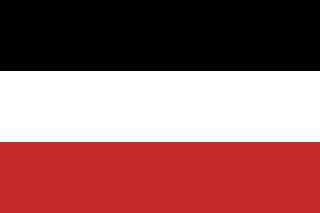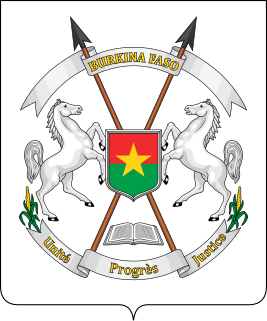| |||||
| Decades: | |||||
|---|---|---|---|---|---|
| See also: | |||||
Events in the year 1993 in Burkina Faso .
| |||||
| Decades: | |||||
|---|---|---|---|---|---|
| See also: | |||||
Events in the year 1993 in Burkina Faso .

Burkina Faso is a landlocked country in West Africa with an area of 274,200 km2 (105,900 sq mi), bordered by Mali to the northwest, Niger to the northeast, Benin to the southeast, Togo and Ghana to the south, and the Ivory Coast to the southwest. It has a population of 20,321,378. Previously called Republic of Upper Volta (1958–1984), it was renamed Burkina Faso by President Thomas Sankara. Its citizens are known as Burkinabè, and its capital and largest city is Ouagadougou.

The history of Burkina Faso includes the history of various kingdoms within the country, such as the Mossi kingdoms, as well as the later French colonisation of the territory and its independence as the Republic of Upper Volta in 1960.

The Republic of Upper Volta was a landlocked West African country established on 11 December 1958 as a self-governing colony within the French Community. Before becoming autonomous, it had been part of the French Union as the French Upper Volta. On 5 August 1960, it gained full independence from France. On 4 August 1984, it changed its name to Burkina Faso.

Blaise Compaoré is a Burkinabé-Ivorian former politician who served as the second president of Burkina Faso from 1987 to 2014. He was a close associate of the first president, Thomas Sankara, during the 1980s, and in October 1987, he led a coup d'état during which Sankara was killed. Subsequently, he introduced a policy of 'rectification', overturning the leftist and Third Worldist policies pursued by Sankara. He won elections in 1991, 1998, 2005 and 2010, in what were considered unfair circumstances. His attempt to amend the constitution to extend his 27-year term caused the 2014 Burkinabé uprising. On 31 October 2014, Compaoré resigned, whereupon he fled to the Ivory Coast.

The Mossi language (Mooré) is a Gur language of the Oti–Volta branch and one of two official regional languages of Burkina Faso. It is the language of the Mossi people, spoken by approximately 8 million people in Burkina Faso, Ghana, Cote d’Ivoire, Benin, Niger, Mali, Togo and Senegal as a native language, but with many more L2 speakers. Mooré is spoken as a first or second language by over 50% of the Burkinabè population and is the main language in the capital city of Ouagadougou. It is one of the official regional languages in Burkina Faso and is closely related to Dagbani, with which is is mutually intelligible. Mossi is also known as Mòoré, Mooré, Moré, Moshi, Moore or More.

The Burkina Faso national football team, represents Burkina Faso in men's international football and is controlled by the Burkinabé Football Federation. They were known as the Upper Volta national football team until 1984, when Upper Volta became Burkina Faso. They finished fourth in the 1998 Africa Cup of Nations, when they hosted the tournament. Their best ever finish in the tournament was the 2013 edition, reaching the final.

Burkina Faso elects on the national level a head of state – the president – and a legislature. The president is elected for a five-year term by the people. The National Assembly has 127 members, elected for a five-year term by proportional representation. Burkina Faso has held democratic elections since 1965. The history of elections has been slightly inconsistent, with the government dynamically changing at the hands of various coups, constitutional changes, and boycotts from various political parties. In 2015, the country experienced its first peaceful and fair election ever. Corruption plagued Burkina Faso's presidential elections for 50 years, but following a coup overthrowing Blaise Compaoré, the nation has seen more democratic and less corrupt electoral processes. Terrorism has played a substantial role in Burkina Faso's elections, with candidates running on the promise to keep the nation safe from the rise of Islamic jihadism they experienced in the 2010s. Historically, a few different parties have held power in Burkina. The Organization for Popular Democracy – Labour Movement was former president Compaoré's party affiliation, and thus they held power from 1987 to 2014. His party took power through a coup, and in 2014 also lost their control when the Regiment of Presidential Security overthrew the government.

Roch Marc Christian Kaboré is a Burkinabé banker and politician who served as the President of Burkina Faso from 2015 until he was deposed in 2022. He was the Prime Minister of Burkina Faso between 1994 and 1996 and President of the National Assembly of Burkina Faso from 2002 to 2012. Kaboré was also president of the Congress for Democracy and Progress (CDP) until his departure from the party in 2014. He founded the People's Movement for Progress party that same year.

The unicameral National Assembly is Burkina Faso's legislative body. In 1995, it became the lower house of a bicameral Parliament, but the upper house was abolished in 2002. The upper house was to have been restored under the name "Senate" in the June 2012 constitutional amendments. This revision was never executed due to an extended and unresolved political confrontation over the Senate's establishment, which left the country effectively with a unicameral legislature as of the October 2014 constitutional crisis.

Zorgho is a town in 8the Zorgho Department of Ganzourgou Province in Burkina Faso. Zorgho is the capital of Zorgho Department and Ganzourgou Province and has a population of 35,398.
Articles related to Burkina Faso include:

The Constitution of Burkina Faso was approved by referendum on 2 June 1991, formally adopted 11 June 1991 and last amended in January 2002. The last amendment abolished the upper chamber of the parliament, the Chamber of Representatives.

Presidential elections were held in Burkina Faso on 21 November 2010. Incumbent president Blaise Compaoré was re-elected with 80% of the vote. The elections were marred by claims of widespread fraud.

The Rally of Social-Democrat Independents was a political party in Burkina Faso led by Alain Bédouma Yoda.

Alternative Faso is a liberal political party in Burkina Faso led by Ablassé Ouedraogo.

The National Convention for the Progress of Burkina was a political party in Burkina Faso led by Jourouboundou René Lompo.

The Greens of Burkina is a political party in Burkina Faso.

The People's Movement for Progress is a political party in Burkina Faso that was founded on 25 January 2014 by former Congress for Democracy and Progress member Roch Marc Christian Kaboré. Kaboré ran as the party's presidential candidate in the 2015 general election and was elected in the first round of voting; the MPP also won a plurality of seats in the National Assembly of Burkina Faso. It is a full member of the Progressive Alliance and Socialist International. On January 24, 2022, Kaboré was deposed as Burkina Faso President and arrested following a military coup.

Burkina Faso–China relations refers to the foreign relations between Burkina Faso and China. Burkina Faso has an embassy in Beijing and China has an embassy in Ouagadougou.